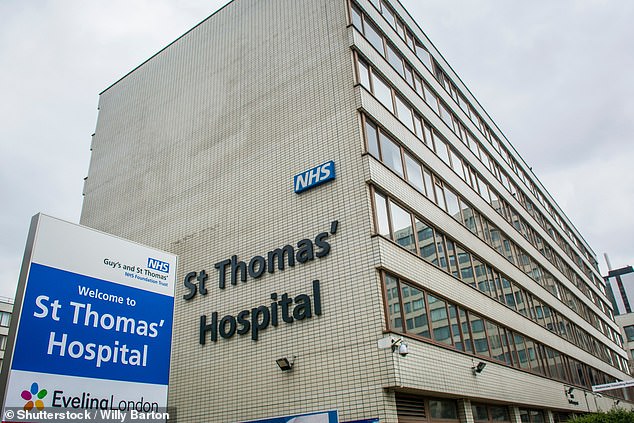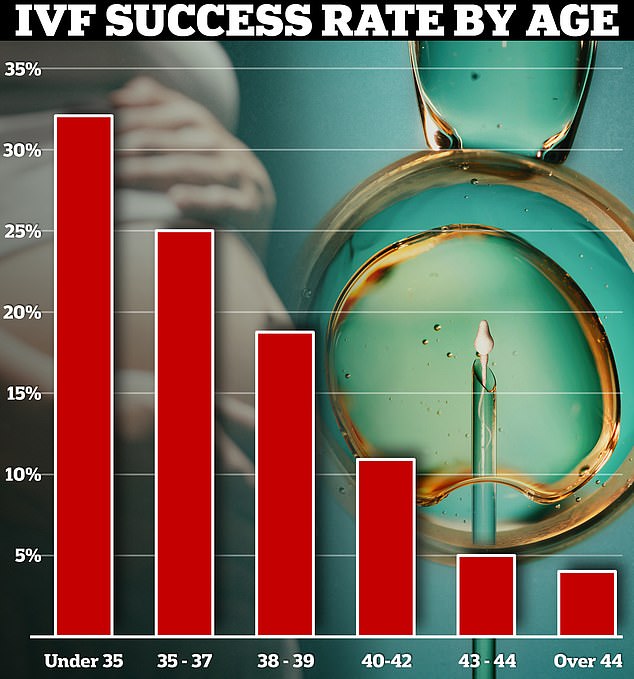ANOTHER fertility clinic is being rocked by a heartbreaking egg freezing ‘mistake’, amid fears a blunder has robbed dozens of British women of the chance to have children
Another fertility clinic has been confirmed to be using the same ‘faulty’ product feared to have destroyed frozen eggs and embryos from 136 women.
The Jessop Fertility clinic in Sheffield, which serves both NHS and private patients, has been announced as the second location to be affected by the product.
It joins Guy’s and St Thomas’ NHS Trust in London, which yesterday confirmed that dozens of women may have lost the chance to become birth mothers due to a mistake with a freezing solution.
Rachel Cutting, from the Human Fertilization and Embryology Authority (HFEA), said: ‘HFEA can confirm that this issue is limited to two clinics in Britain: Guys’ and St Thomas’ Assisted Conception Unit, London and Jessop Fertility, Sheffield.
‘Our ongoing investigation only concerns Guys’ as we believe Jessop carried out a thorough investigation when they first became aware of the issue and reached out and supported every patient involved.
‘The company that supplies the product directly to clinics knows exactly where it went through their traceability processes.
“Patients likely to be affected have been notified by their clinic.”
*** To have YOU have you been told that your eggs or embryos are no longer viable? Email John Ely at john.ely@mailonline.co.uk ***
136 women may have lost their chance to become biological parents, with an NHS fertility clinic warning that their frozen eggs and embryos may not survive the thawing process due to an error (stock image)

All women had eggs or embryos frozen at Guy’s and St Thomas’ NHS Trust between September and October 2022
The number of women affected at Jessop has not been confirmed.
It is also unknown whether the solution was sent to more UK IVF clinics as well as used.
Sarah Norcross, director of the Progress Educational Trust, a charity that represents people affected by infertility, said of news of the error: ‘It will be distressing for women with frozen eggs to hear that their eggs, due to problems beyond their control, do not survive the thawing process.
‘We need to gain a better understanding of what exactly went wrong, whether patients in other clinics are affected, and what the relevant regulators – including the HFEA and the Medicines and Healthcare Products Regulatory Agency – are doing about it.
‘We also need reassurance, both from regulators and clinics, that there are processes in place to notify patients in a timely manner if something goes wrong.’
Catherine Slattery, a specialist medical negligence lawyer at law firm Irwin Mitchell, said they were in contact with some of the women affected.
“This is a deeply concerning incident that could have potentially devastating consequences for women, especially those who have suffered the physical and psychological consequences of cancer treatment,” she said.
‘We have been contacted by a number of women who may be affected and are investigating their concerns further.
‘Some women are based in London and have been treated at Guy’s Hospital, while others are based elsewhere in England and Wales.’
Cancer patients who have had their uteruses surgically removed are among the affected women at Guy’s.
Treatment for some types of cancer can leave women infertile, meaning they may be recommended to freeze their eggs beforehand.
News of the blunder was only communicated to patients in the past two weeks.
The hospital, which learned of the error in March last year, blamed the delay in communicating the issue to confusion over which specific batches were affected.
The delay between when the incident occurred and when the women discovered the mistake means some may run out of extra eggs to freeze, effectively dashing their hopes of ever becoming a biological parent .
Even those who may still have the option for further IVF treatments may face vastly greater problems.
The chance of successful IVF decreases rapidly as women age, from 32 percent for women under 35 to just 4 percent for women over 44, declining by about 6 to 7 percent every few years.
Ms Norcross condemned the “appalling delay” in informing patients.

Currently, fertility treatment has a success rate of up to 40 percent. About a third of IVF cycles among under-35s resulted in a live birth in Britain in 2019. Yet this fell to just 4 percent among those over 44
All affected women at Guy’s had eggs or embryos frozen at the clinic in the fall of 2022, between September and October.
The clinic, which boasts of being one of the most advanced of its kind in the country, takes in both NHS and private patients, charging the latter thousands of pounds for IVF treatment and hundreds of pounds for egg and embryo cryopreservation.
Patient leaflets quote the cost of IVF embryo freezing at £4,750 and the annual storage charge for cryopreservation at £350.
A letter to the women, seen by The Times, informed them that their eggs and embryos “may not survive the thawing process” due to a manufacturing error in the bottles of solution used to originally freeze them.
HEFA is actively investigating the incident.
Guy has apologized for the delay in communicating the issue and offered counseling to the women.
Guy’s Assisted Conception Unit treats approximately 2,000 patients per year.
Women affected by the loss of the eggs and embryos say they are devastated.
One, who spoke anonymously, said: ‘The doctor told me that the eggs I had frozen are probably not viable due to a faulty freezing process. It’s been devastating.
“It’s traumatizing for those poor women to hear that their frozen eggs can’t be used.”
She called on Guy’s to cover the costs of further fertility treatments.
A Trust spokesperson said: ‘We have contacted everyone affected and apologize for the delay and any inconvenience this may have caused.
‘We are supporting those who may be affected, including through our advice service, and urge anyone with concerns to speak to us directly on the dedicated telephone line we have set up.’
The Conception Unit became aware of the problem just weeks after the Medicines and Healthcare products Regulatory Agency issued an alert about problems with the freezing solution.
The HFEA recorded more than 4,200 egg storage cycles in 2021, almost double the 2,500 in 2019.
It is thought the number of women freezing their eggs surged during the Covid-19 crisis as many feared they were running out of time to have a baby.
The pandemic halted dating for single women for months, leaving some unsure when they would meet the right partner to start a family.
Egg freezing involves following the initial steps of IVF, which takes two to three weeks.
Women use medications to stimulate their egg production and mature the eggs.
The eggs are then collected under general anesthesia, mixed with a freezing solution and frozen.
Seven to fourteen eggs are collected from most patients under 38 years of age. On average, women lose about 1,000 eggs per month.
